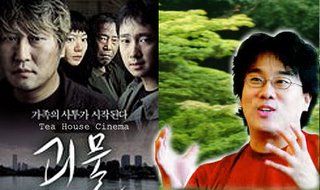
Director: Bong Joon-ho
Writing New Chapter in Korean Film Historyfrom: KBS News http://english.kbs.co.kr/
Profile
Born in 1969; graduated from Jamsil High School, Yonsei University (Department of Sociology).
Filmography: “Barking Dogs Never Bite” (2000), “Memories of Murder” (2003), “The Host” (2005), “Different Trains” (2008).
Awards: Best Director Award, Best Script Award, Best Picture Award for “Memories of Murder” at 2003 Chunsa Film Festival ; Best Director Award for “Memories of Murder” at 2003 Daejong Film Festival; Int’l Critics’ Award for “Barking Dogs Never Bite” at 25th Hong Kong Int’l Film Festival.
Bong captivated the hearts of moviegoers with his blockbusters “The Host” and “Memories of Murder.” He has created three full length films so far, with two of them receiving rave reviews from critics and succeeding at the box-office, and the third one having become the most successful movie in the history of Korean cinematography. But if you take a closer look at how those films were made, you will see that all three movies presented Bong with unimaginable difficulties, which intensified every time he produced a new movie.
Bong seized the opportunity to debut as an ambitious filmmaker with his first work, “Barking Dogs Never Bite,” when he was working for Uno Film, which was later renamed Sidus FNH and went on to become the largest film production company in Korea. That opportunity was presented to him by the company’s CEO, Cha Seung-jae. But the film’s script that Bong showed Cha was strange enough to perplex his boss. It was a story about a part-time university lecturer who begins to kidnap dogs in his neighborhood because they keep barking and disturbing him. Another main character of the movie is an eccentric girl who has graduated from a trade high school and works at a local district office.
Bong’s debut quite naturally followed his career as an assistant director of the movie “Motel Cactus,” which was produced by Uno Film. But in the beginning, everybody found Bong’s ideas preposterous. His second movie, “Memories of Murder,” also presented him with serious challenges following the failure of “Barking Dogs Never Bite.” Few believed in the potential of “Memories of Murder”; nevertheless, it succeeded. Everybody thought Bong would be happy to begin work on his next movie. But when the subject of the new movie was revealed, it was ridiculed: it would be about a monster. Nobody would even listen to what Bong had to say about the subject.
Despite all expectations, “The Host” evoked applause and praise at its debut at the 59th Cannes International Film Festival. The film drew the spotlight when Bong announced his plan to make a movie about a monster living in Seoul’s Han River, because films about monsters were not popular at a time when Korean cinematography was expanding its adventure genre and rapidly polishing its techniques. “The Host” aroused curiosity while it was still being made. That curiosity snowballed when the film received praise at Cannes, and reached its peak when the movie’s promotional poster showing only the tail of the monster was unveiled.
“The Host” showed the powerful result Korean cinematography can achieve when fusing drama with spectacle. The monster, the main reason for public curiosity, fully met the expectations of viewers, while the drama portraying a family’s efforts to find a girl kidnapped by the monster created tense suspense in the movie. Adding to the thrilling plot was the realistic depiction of life in Korea and black comedy that occasionally permeated the tense moments in the film, placing “The Host” in a different position from Hollywood blockbusters. “The Host” is yet additional evidence of Bong’s ability to find success against all odds. His secret probably lies in his confidence that he says grows stronger whenever he receives criticism. “The Host” became the most successful movie in the history of Korean film, and remakes based on it will soon be produced in Japan and even the United States, which had expressed worries that the movie was anti-American.
Bong has given hints about his fifth movie, “Different Trains,” which will be produced in English in cooperation with director Park Chan-wook (Park’s company, Moho), who produced “Old Boy,” as well as a multinational production crew. The new film is based on the French cartoon “Le Transperceneige,” which won the grand prize of the 1986 Angouleme International Comics Festival. It is a story about the last survivors of a sudden ice age that hits the Earth: two different trains carrying the survivors: one carrying politicians and high-profile figures indulging in drinking and drug use, and the other one carrying ordinary people who must scramble to find food to survive. Bong will make an omnibus movie this year in cooperation with renowned French filmmaker Leos Carax. Next year, he will produce a movie about a mother and a son, and afterward will launch the production of “Different Trains”.

Nenhum comentário:
Postar um comentário